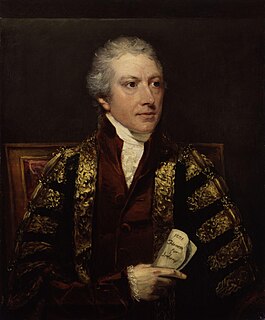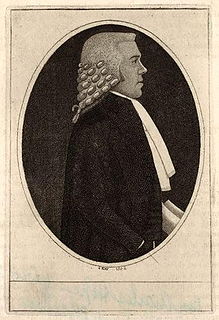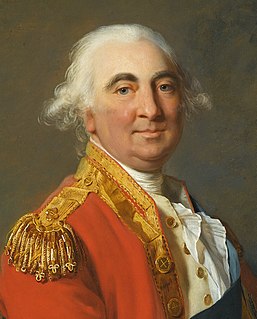
Henry Dundas, 1st Viscount Melville, PC, FRSE was a Scottish advocate and Tory politician. He was the trusted lieutenant of British prime minister William Pitt, and the most powerful man in Scotland in the latter decades of the 18th century.

Marquess of Zetland is a title in the Peerage of the United Kingdom. It was created on 22 August 1892 for the former Lord Lieutenant of Ireland, Lawrence Dundas, 3rd Earl of Zetland. Zetland is an archaic spelling of Shetland. The Dundas family descends from the wealthy Scottish businessman and Member of Parliament, Lawrence Dundas. In 1762 he was created a Baronet, of Kerse in the County of Linlithgow, in the Baronetage of Great Britain. The title was created with remainder, failing heirs male of his own, to his brother Thomas Dundas and the heirs male of his body. He was succeeded by his son, the second Baronet. He represented Richmond and Stirling in the House of Commons and also served as Lord Lieutenant of Orkney and Shetland. In 1794 he was created Baron Dundas, of Aske in the North Riding of the County of York, in the Peerage of Great Britain. Lord Dundas notably purchased the right to the earldom of Orkney and lordship of Zetland from James Douglas, 14th Earl of Morton.

Charles Manners-Sutton, 1st Viscount Canterbury, was a British Tory politician who served as Speaker of the House of Commons from 1817 to 1835.

Her Majesty's Solicitor General for England and Wales, known informally as the Solicitor General, is one of the law officers of the Crown in the government of the United Kingdom. They are the deputy of the Attorney General, whose duty is to advise the Crown and Cabinet on the law. They can exercise the powers of the Attorney General in the Attorney General's absence. Despite the title, the position is usually held by a barrister as opposed to a solicitor.

Charles Abbot, 1st Baron Colchester PC, FRS was a British barrister and statesman. He served as Speaker of the House of Commons between 1802 and 1817.

Charles Dundas, 1st Baron Amesbury was a British politician.

Admiral Sir James Whitley Deans Dundas GCB was a Royal Navy officer. He took part in the Napoleonic Wars, first as a junior officer when he took part in the Anglo-Russian invasion of Holland in Autumn 1799 and later as a commander when he was in action at Copenhagen Dockyard shortly after the capture of that City in August 1807. He also served as Whig Member of Parliament for Greenwich and then for Devizes and became First Naval Lord in the First Russell ministry in July 1847 and in that role his service was dominated by the needs of Whig party. He was appointed Commander-in-Chief in the Mediterranean in 1852 and led all naval operations in the Black Sea including the bombardment of Sevastopol in October 1854 during the Crimean War.

Vice-Admiral Sir Richard Saunders Dundas, was a Royal Navy officer. As a captain, he took part in the capture of the Bogue forts in January 1841, during the First Opium War. He was appointed to the command of the Fleet in the Baltic Sea, in succession to Sir Charles Napier, in February 1855 and led the naval support during the latter stages of the Crimean War, enforcing a strict blockade and carrying out the bombardment of Sveaborg in August 1855. He was appointed First Naval Lord in the first Palmerston ministry in November 1857 and then, after stepping down to be Second Naval Lord during the second Derby–Disraeli ministry, he stepped up again to become First Naval Lord in the second Palmerston ministry in June 1859 remaining in office until his death. The Prime-Minister described Dundas as "a most distinguished officer".

Rt Hon Lord Charles Hope FRSE was a Scottish politician and judge.
Robert Dundas of Arniston, the Elder, 2nd Lord Arniston (1685–1753) was a Scottish lawyer, and Tory politician who sat in the House of Commons from 1722 to 1737. In 1728 he reintroduced into Scottish juries the possible verdicts of guilty or not guilty as against proven or not proven. He was Lord President of the Court of Session from 1748 to 1753..

Ochtertyre is a settlement in Perth and Kinross, Scotland. It lies between Crieff and Loch Turret, north of the A85.
Henry Powle was an English lawyer and politician who sat in the House of Commons at various times between 1660 and 1690. He was Speaker of the House of Commons from January 1689 to February 1689. He was also Master of the Rolls.

This is a list of the principal holders of government office during the premiership of the Earl of Shelburne between July 1782 and April 1783.

The Principal Secretary of State, or Principal Secretary of the Council, was a government office in the Kingdom of Ireland. It was abolished in 1801 when Ireland became part of the United Kingdom of Great Britain and Ireland under the Acts of Union 1800.
Admiral Robert Honyman was a Scottish admiral in the British Royal Navy who served in the French Revolutionary Wars and in the Napoleonic Wars. A native of Orkney, he also held office for ten years as a member of parliament (MP) for Orkney and Shetland.
The Commissioners of Highland Roads and Bridges was created in 1803 to take responsibility for the construction and maintenance of the long-distance roads in the Scottish Highlands.

The 1780 election of the Speaker of the House of Commons occurred on 31 October 1780.

The 1770 election of the Speaker of the House of Commons occurred on 22 January 1770.

The 1817 election of the Speaker of the House of Commons occurred on 2 June 1817.

The 1835 election of the Speaker of the House of Commons occurred on 19 February 1835.
















